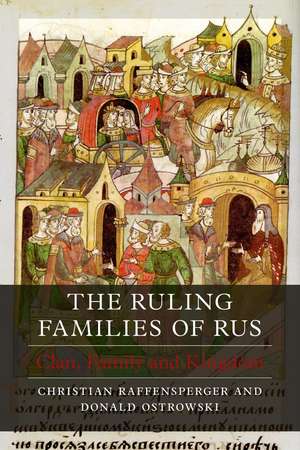The Ruling Families of Rus: Clan, Family and Kingdom: Dynasties
Autor Christian Raffensperger, Donald Ostrowskien Limba Engleză Hardback – 10 sep 2023
Kyivan Rus’ was a state in northeastern Europe from the late ninth to the mid-sixteenth century that encompassed a variety of peoples, including Lithuanians, Polish, and Ottomans. The Ruling Families of Rus explores the region’s history through local families, revealing how the concept of family rule developed over the centuries into what we understand as dynasties today. Examining a broad range of archival sources, the authors examine the development of Rus, Lithuania, Muscovy, and Tver and their relationships with the Mongols, Byzantines, and others. The Ruling Families of Rus will appeal to scholars interested in the medieval history of eastern Europe.
Preț: 163.95 lei
Preț vechi: 173.24 lei
-5% Nou
Puncte Express: 246
Preț estimativ în valută:
31.39€ • 32.69$ • 26.05£
31.39€ • 32.69$ • 26.05£
Carte disponibilă
Livrare economică 23-30 ianuarie
Livrare express 08-14 ianuarie pentru 57.13 lei
Preluare comenzi: 021 569.72.76
Specificații
ISBN-13: 9781789147155
ISBN-10: 1789147158
Pagini: 320
Ilustrații: 28 color plates, 34 halftones
Dimensiuni: 159 x 235 x 38 mm
Greutate: 0.86 kg
Editura: REAKTION BOOKS
Colecția Reaktion Books
Seria Dynasties
ISBN-10: 1789147158
Pagini: 320
Ilustrații: 28 color plates, 34 halftones
Dimensiuni: 159 x 235 x 38 mm
Greutate: 0.86 kg
Editura: REAKTION BOOKS
Colecția Reaktion Books
Seria Dynasties
Notă biografică
Christian Raffensperger is the Kenneth E. Wray Chair in the Humanities at Wittenberg University. Donald Ostrowski is a lecturer at the Harvard Extension School and an associate of the Harvard Ukrainian Research Institute.
Recenzii
"The Ruling Families of Rus explores the area's history through local families, revealing how the concept of family rule developed over the centuries into what we understand now as dynasties. This book took my knowledge of Russian history much further back than the Romanovs. I highly recommend it to all [who are] into Russian or Medieval European history."
"The originality of this study of Rus lies in its focus on specific families which dominated political life and deeply affected social, cultural, and religious life there . . . the book has many strengths. The authors show deep knowledge of primary sources and look critically at original narratives in them that have been too readily accepted by numerous later historians. They display a command of the secondary literature on their subject. They carefully examine such complex matters as interfamilial and interclan relationships and rivalries, the rise and decline of different regions within the lands of Rus, and shifts in the complex understandings and practices governing inheritance and succession. It should also be said that the book is attractively produced and generously illustrated."
"‘In the current context of the Russian-waged war in Ukraine, calls to decolonize the study of Eastern Europe and Eurasia abound. The search is on to shed the teleological framework that casts Russia’s early modern and modern imperial ambitions into the medieval past and onto the lands that comprise today’s Belarus and Ukraine. In The Ruling Families of Rus, Christian Raffensperger and Donald Ostrowski provocatively venture to displace some of the myths of Russia’s aggrandizement that have been projected onto a medieval past that belongs to many others. The authors destabilize claims of a continuous Riurikid dynasty often used to link the Kyivan past with late medieval Muscovy, and instead focus on families, which opens historical space for women and the numerous kniazi who lived their lives unaware of the national historiographical claims that would come to define modern visions of the East European medieval period. Tracing the stories of families and individuals from the ninth to the late sixteenth century, this book evidences the entanglement of peoples across Europe and Eurasia and shows readers how diversity of intention is a mark of both the present and the past. Raffensperger and Ostrowski take a brave step in replacing the popularized Russian myth of the Middle Ages with a history that emphasizes multiplicity and complexity of identities, relationships and choices."




